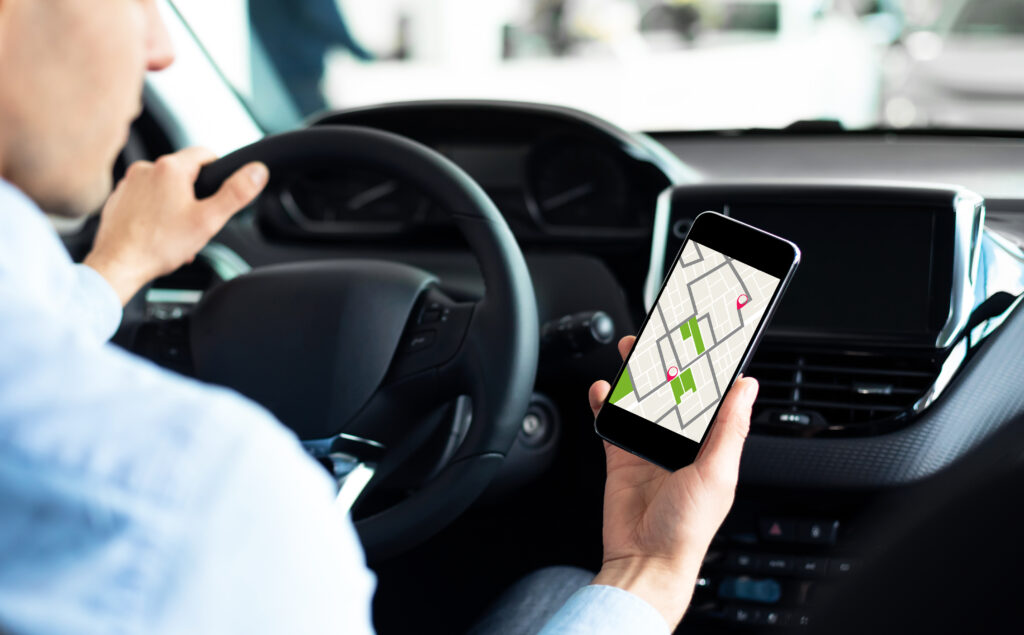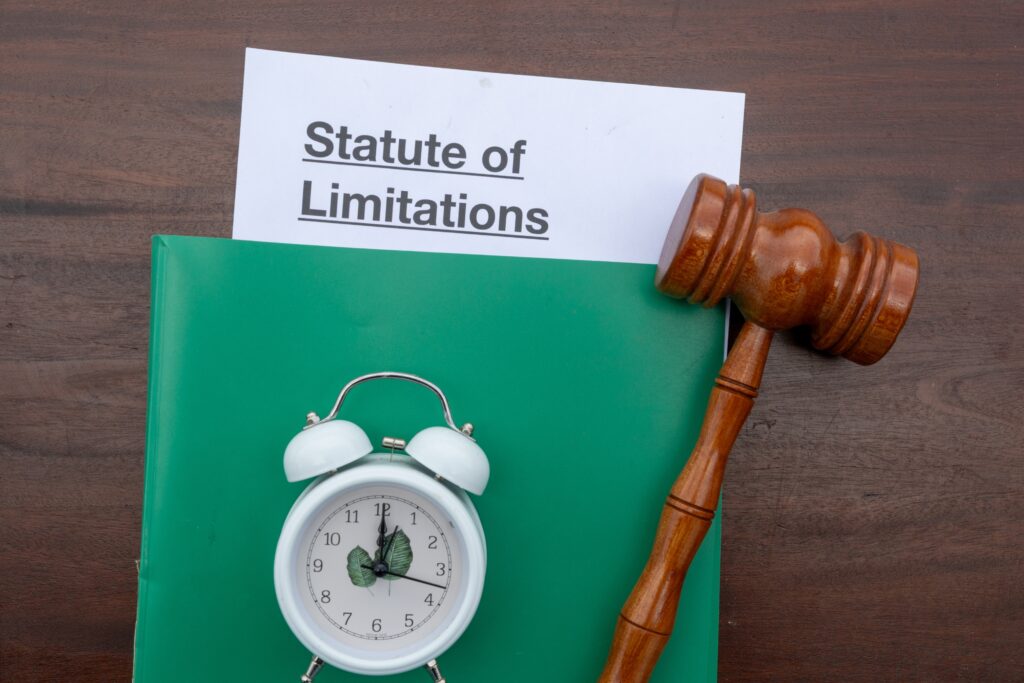After a rideshare accident, your first challenge from home is figuring out which insurance policy is responsible for your injuries and losses. The answer depends on the driver’s status in the app at the exact moment of the crash, creating a confusing situation of overlapping coverage between their personal policy and the rideshare company’s commercial insurance.
Figuring this out is not your burden to bear while you recover. Our Oklahoma car accident lawyer is here to manage these legal hurdles for you. If you were injured in a rideshare accident, call Carr & Carr Injury Attorneys for a free consultation at (405) 691-1600.
The Insurance Puzzle: Who Pays for Your Injuries?
Think of it like a traffic light: the coverage changes depending on which light was “on” for the driver in their app.
Scenario 1: The Driver Was Offline or the App Was Off
If the driver was not logged into the Uber or Lyft app, they are considered off-duty. In this situation, the rideshare company’s insurance does not apply. Your claim would be directed to the driver’s personal auto insurance policy, just like in any other car accident.
Scenario 2: The Driver Was Logged In and Waiting for a Ride Request

This is a gray area where the driver is “on the clock” but doesn’t have a passenger. During this period, a limited liability policy from the rideshare company is active. Oklahoma law requires Transportation Network Companies (TNCs) to provide coverage of at least:
- $50,000 for death and bodily injury per person.
- $100,000 for death and bodily injury per accident.
- $25,000 for property damage per accident.
Scenario 3: The Driver Was En Route to a Passenger or Transporting You
Once the driver accepts a ride request and is on their way to pick someone up, or has a passenger in the car, the full commercial liability policy is triggered. This policy typically provides up to $1 million in liability coverage. This is the policy that would cover you as a passenger, or if you were a pedestrian or in another vehicle hit by the rideshare driver during this time.
Your First Moves from Home: Protecting Your Right to Compensation
The focus now is on documenting everything and seeking proper medical care.
Create a File for Everything
Start a physical or digital folder. Include any photos or videos you have of the vehicles or your injuries, the police report number, and the contact information for any witnesses.
Track Your Symptoms and Medical Treatment
Keep a simple daily journal. Note your pain levels, any new symptoms, and how the injuries affect your daily life. This record is more descriptive than sterile medical records alone. It shows the real-world impact of an injury like whiplash.
Follow Your Doctor’s Orders Precisely
Attend every scheduled appointment, physical therapy session, and follow-up. If you stop treatment, an insurance company might argue your injuries were not as severe as you claim. Following through shows you are serious about your recovery.
Be Careful What You Say
You may be contacted by an insurance adjuster from the rideshare company or the driver’s personal insurer. You are not required to give a recorded statement. It’s better to decline until you have spoken with an attorney. Anything you say can be used to minimize or deny your claim. Stick to the basic facts and nothing else; avoid discussing fault or the severity of your injuries.
Who Was at Fault? Establishing Negligence in a Rideshare Crash
To secure compensation, you must show that another party was negligent. Negligence is a legal concept that means someone failed to act with reasonable care, causing you harm.
How is Fault Determined?
- The Police Report: This is the first draft of what happened, not the final word. It contains important details, but may not capture the full picture.
- The Rideshare Company’s Data: Uber and Lyft track GPS data, speed, and braking information, which help reconstruct the accident.
- Witness Statements: Independent accounts might bolster your case, but we need to move fast. Memories fade very quickly.
Who Could Be Liable?
- The Rideshare Driver: If they were speeding, distracted, or violated traffic laws.
- The Rideshare Company: In some cases, the company itself may be held responsible under a doctrine called vicarious liability if they were negligent in hiring or retaining a dangerous driver.
- Another Driver: Many rideshare accidents involve more than one vehicle. The driver of the other car could be fully or partially at fault.
- A Third Party: If a faulty traffic light or a defective vehicle part contributed to the crash, a government entity or manufacturer could be liable.
Why Rideshare Claims Are More Complicated
Rideshare accidents aren’t like typical car wrecks. Research shows that the introduction of ridesharing has been linked to an increase in traffic fatalities, with one University of Chicago study estimating about 987 additional deaths per year.
You May Be Dealing with Multiple Insurance Adjusters
Instead of one insurance company, you might be contacted by adjusters from the driver’s personal policy, the rideshare company’s policy, and another driver’s policy. Each has a different interest, and they are not focused on yours.
The Urban Factor
Many Uber and Lyft crashes happen in urban areas. This means accidents in cities like Oklahoma City are more likely to involve pedestrians, cyclists, or complex multi-vehicle scenarios, adding layers of liability.
The Burden of Proof is on You
It is up to you, the injured party, to prove who was at fault and the extent of your damages. The rideshare company has teams of lawyers; you need someone on your side to level the playing field. A law firm that handles these specific cases can manage the investigation and build a strong claim on your behalf.
How App Status is Determined in a Rideshare Claim
Insurance coverage hinges on the driver’s status in the rideshare app. But how is that verified? Here’s how your attorney may confirm app status:
- Trip Records: Uber and Lyft maintain internal logs of every trip, including timestamps, pickup and drop-off locations, and ride status at the time of crash.
- Driver App Screenshots: If available, screenshots from the driver’s phone showing their app status at the time of the accident can be powerful evidence.
- Electronic Data Discovery: In serious cases, your legal team can subpoena GPS logs, speed data, braking events, and trip activity directly from the rideshare company.
- Company Reports: Once notified of a crash, Uber or Lyft may send an incident summary. These can help clarify whether the commercial policy applies.
Because this data is controlled by the rideshare company, you must report the accident promptly and involve legal counsel early.
Reporting the Crash to the Rideshare Company
Even if police are called and a report is filed, you should still report the accident directly to the rideshare company through their app.
Steps to report the crash:
- Uber: Open the app > “Your Trips” > Select the trip > Scroll down to “Help” > Tap “Report a Safety Issue.”
- Lyft: Open the app > Tap the menu > “Ride History” > Select ride > “Get Help” > Report accident.
What happens next?
- You may receive an email or call from a representative within a few days.
- You’ll be asked for basic accident details and whether you were injured.
- The company will begin their internal incident process, which helps establish a formal record of the event.
Even if you were not the passenger but were struck by a rideshare driver, this process still applies. Filing this report helps trigger access to the company’s commercial policy and speeds up the claims process.
What Does a Settlement or Verdict Actually Cover?
The goal of a personal injury claim is to make you “whole” again in the eyes of the law. Compensation is divided into two main categories.
Economic Damages: The Tangible Losses
These are the verifiable, out-of-pocket costs you’ve incurred.
- Medical Expenses: Every bill from the emergency room, surgeons, physical therapists, and for future medical needs.
- Lost Wages: The income you lost while unable to work.
- Loss of Earning Capacity: If the injury prevents you from returning to your previous job or earning the same income in the future.
Non-Economic Damages: The Intangible Harms
These damages compensate you for the human cost of the accident.
- Pain and Suffering: For the physical pain and emotional distress caused by the injury.
- Loss of Enjoyment of Life: For the impact on your hobbies, relationships, and daily activities.
Don’t Let Time Run Out: Oklahoma’s Statute of Limitations

Oklahoma law sets a deadline for filing a personal injury lawsuit, known as the statute of limitations.
In most cases, you have two years from the date of the accident to file a lawsuit.
If you miss this deadline, the court will likely dismiss your case, and you will lose your right to pursue compensation forever.
Frequently Asked Questions After a Rideshare Accident
What if I was a passenger and my own driver was at fault?
As a passenger, you are almost never considered at fault. You can file a claim against the at-fault driver’s insurance, which in this case would be the $1 million policy provided by Uber or Lyft since you were being transported.
Can I still recover money if I was partially at fault for the accident?
Yes. Oklahoma uses a modified comparative fault rule. You can recover damages as long as your percentage of fault is not greater than the combined fault of the other parties (meaning 50% or less at fault). Your recovery would be reduced by your percentage of fault.
Do I have to pay medical bills myself while the case is ongoing?
Initially, you may need to use your own health insurance or MedPay coverage from your auto policy. An attorney will sometimes arrange for medical providers to treat you under a “letter of protection,” which is a promise to pay them from the eventual settlement or verdict.
What if the driver who caused the crash didn’t have enough insurance—or any at all?
If the at-fault driver was logged into the Uber or Lyft app at the time of the crash, the company’s commercial policy—including uninsured/underinsured motorist (UM/UIM) coverage—may still apply. This coverage helps when the other driver has no insurance or carries only the minimum required by law.
In addition:
- You may also be able to file a UM/UIM claim under your own personal auto policy if you have it.
- Oklahoma allows “stacking” UM/UIM coverage in some cases, depending on how your policy is written.
Your attorney will review all applicable policies and determine the best way to secure full compensation.
Let Us Shoulder the Burden

Your focus should be on your health and your family. Our focus—led by your dedicated Oklahoma personal injury lawyer—is on ensuring your rights are protected and you receive the full compensation you are owed under the law.
You don’t have to face the insurance companies alone. Contact Carr & Carr Injury Attorneys today for a free, no-obligation review of your case. Call us at (405) 691-1600.





